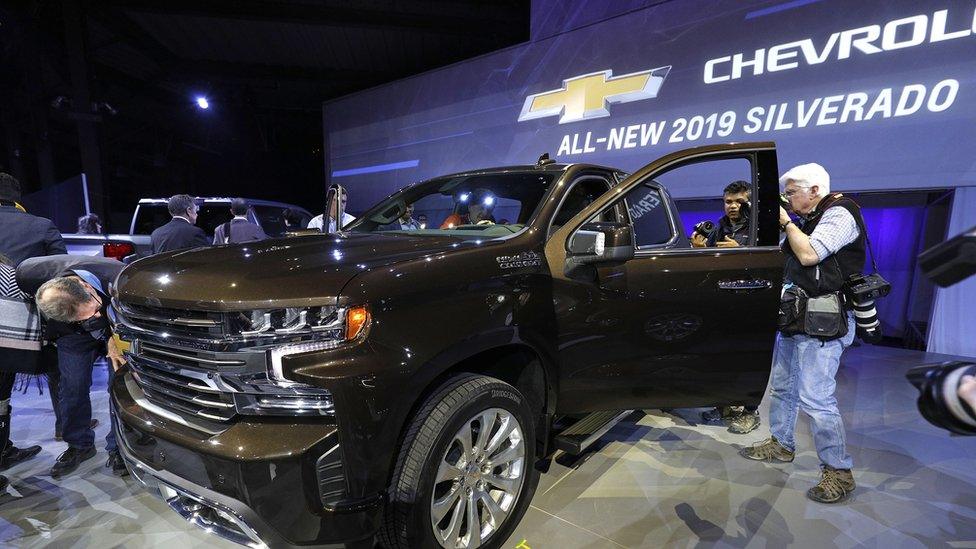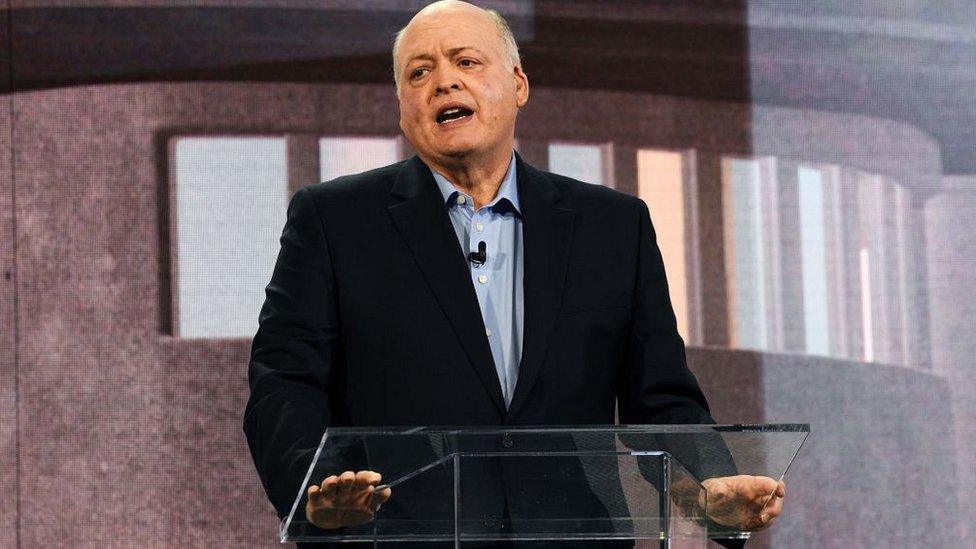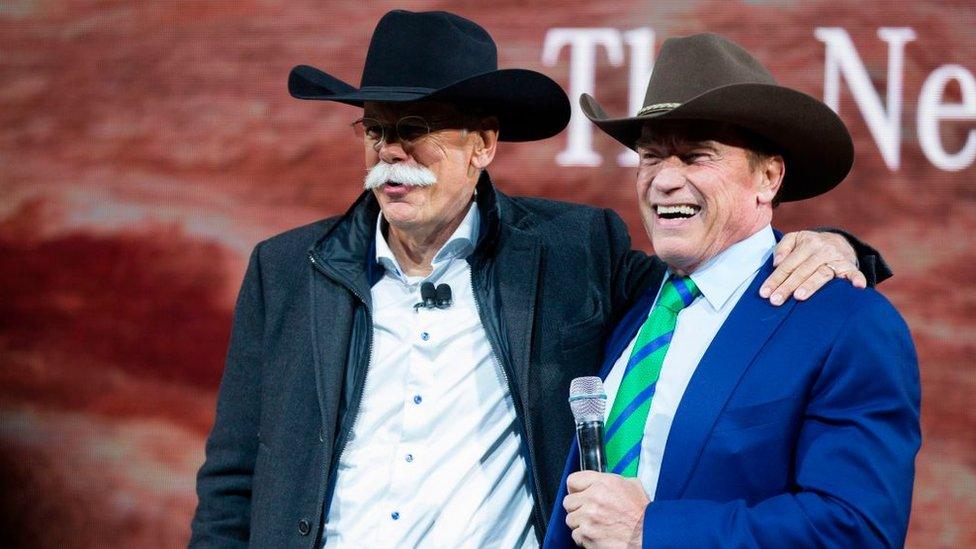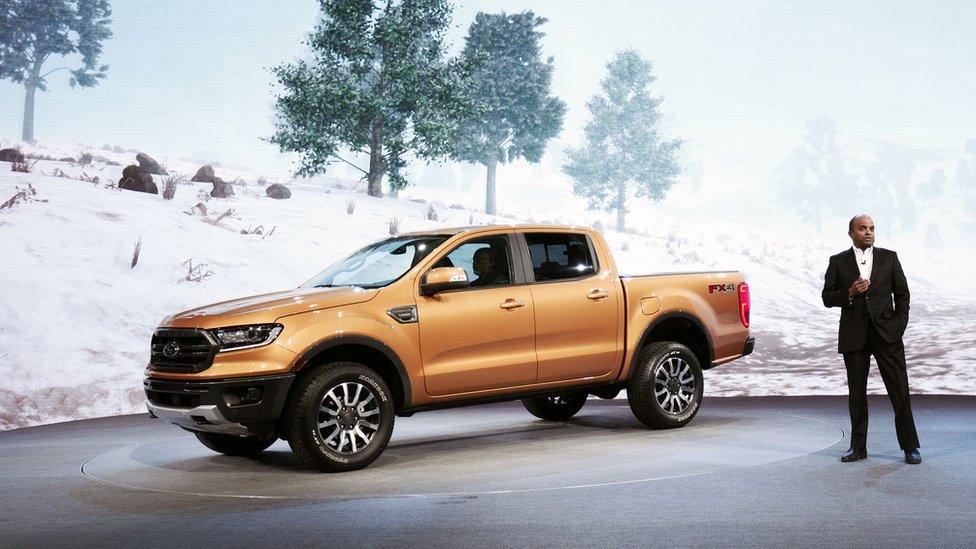Detroit auto show: Will it be upstaged?
- Published

Journalists check out the new Chevrolet Silverado 1500 after its official debut in Detroit
When car companies debut the next big thing, it has traditionally happened here at the North American International Auto Show in Detroit, the mid-western American city that helped launch the industry.
But it was in Las Vegas earlier in January that car executives from Ford and Toyota took the stage at the Consumer Electronics Show to discuss self-driving cars and other new developments.
The shift in venue underscores the way new technologies are shaking up the automotive industry, presenting established US car companies with a host of potential new competitors from Silicon Valley and overseas.
Analysts say Detroit's Big Three - Ford, General Motors and Fiat Chrysler - see the threat and are taking it seriously, investing in ride-sharing, software firms and electric power in an effort to stay ahead of the changes.
"We're not going to cede that future to anyone," Jim Hackett, Ford's chief executive, said in Detroit on Sunday.

Ford will shift investment to develop more trucks and electric and hybrid cars, says CEO Jim Hackett
The North American International Auto Show is also fighting to avoid being upstaged.
Organisers have expanded the event, devoting a large section to "mobility" - the intersection of tech and transit. They have welcomed start-ups and universities and provided platforms to technology executives.
Still, steady talk of "last week at CES" - the consumer electronics show - ran through speeches and side conversations on Sunday as the show got underway.
"Now they may have glitz and glamour in Las Vegas, but here in Detroit we have grit and determination," Congresswoman Debbie Dingell told the crowd. "This is still the premier auto show on the planet and where the future of mobility meets the pavement."
Michigan's stake
For politicians in Michigan like Ms Dingell, there is more at stake than the status of a single conference.
Michigan's position at the centre of the global car industry has changed dramatically since 1950, when the state was home to more than half of all US car manufacturing jobs and foreign companies accounted for a small fraction of sales.

Ford workers in Detroit in the 1930s: Michigan's position at the centre of the global car industry has changed dramatically since the 1950s
Today, foreign companies account for more than half of US sales, and companies have opened plants elsewhere.
Despite the decline, manufacturing remains a big part of Michigan's economy, accounting for more than 16% of new private sector jobs in 2016.
The state is also home to the headquarters of global giants such as Ford and General Motors, which generate thousands of well-paid research and design jobs for the region.
State leaders want to keep it that way.
Michigan has invested in testing facilities for self-driving cars, passed laws to ease the introduction of autonomous vehicles, and built hundreds of miles of "connected" highways with cameras and sensors to transmit data.
"We're the state that put the world on wheels and we want to continue to do that," said Kirk Steudle, Michigan's director of transportation.
Immediate threat?
Analysts expect it to take years - if not decades - before fully self-driving cars become available to the general public.
That's one reason why Max Muncey, a spokesman for the Detroit show, said he isn't worried about the rise of technology on the show.

Arnold Schwarzenegger was on hand at Detroit to help Mercedes-Benz chairman Dieter Zetsche unveil the firm's latest offerings
It is after all organised largely by members of the Detroit Auto Dealers Association - a group focused on car sales now, not in some distant future.
"Ultimately their goal is to move some product as a result of the enthusiasm and excitement coming out of the show." Mr Muncey said. "We want to focus on stuff that is immediately relevant to the global automotive community."
More than 40 products are expected to be launched at this year's show, which opens to the public on 20 January and is expected to draw more than 800,000 people.
On Sunday, Ford introduced a new Mustang Bullitt sports car, Ranger pickup truck and Edge ST sports utility vehicle, with a tech-heavy presentation including interactive video and sound effects.
The event drew hundreds of people - a sign that new cars and trucks still make a splash, even with human drivers at the wheel.

Ford is introducing its new Ford Ranger midsize truck at this year's show
Mr Steudle, the transportation director, said he has been encouraged by signs that tech companies recognise they need the manufacturing know-how of car companies. For example, Google recently said it would expand its presence in the area.
But state leaders said that when it comes to the years ahead, they're not sitting still.
Trevor Pawl is group vice president of Planet M, a state initiative aimed at bringing together government, private companies, universities and other groups to work on the changes in the industry.
"We can't at all sit on our laurels," he said. "We need to look at other states and say how can we continue to compete successfully, because this is a new world."